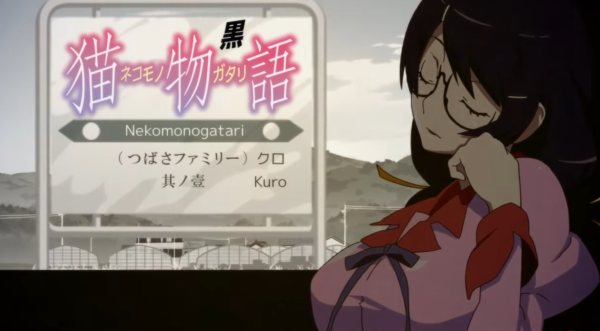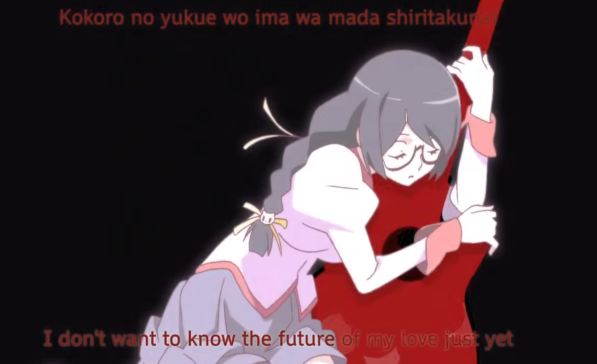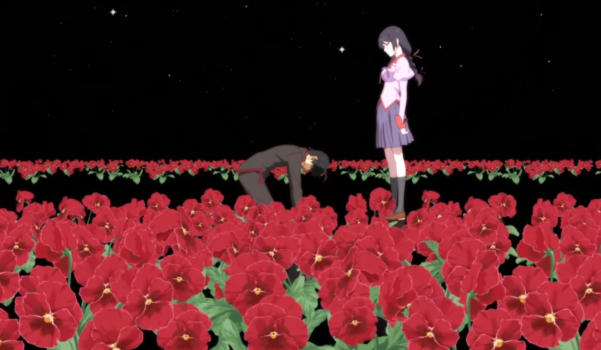So for the Monogatari Opening Analysis series I decided to attempt to follow The Actual Monogatari Watch Order. So far so good. But as a result, we are actually backtracking chronologically to Nekomonogatari: Kuro, which aired after Nisemonogatari but takes place before Bakemonogatari. I believe that’s the case anyways.

I actually was about halfway through writing the analysis for the Tsubasa Tiger opening when I realized that I hadn’t done Nekomonogatari: Kuro. But it actually worked out well, because the two openings have a lot in common and play off each other. Of course, you’ll have to stay tuned for Monogatari Opening Analysis #10 for that! 🙂
If you missed the last opening analysis, Platinum Disco, you can find it here. I definitely suggest checking it out, if only to listen to the song as it’s the best Monogatari opening song out there.
Now to Perfect Slumbers. It’s a nice song. Very relaxing. Lives up to it’s name for sure. Here you go:
Just like the future Tsubasa Tiger analysis that I haven’t yet posted (getting excited yet?), Chocolate Insomnia, Perfect Slumbers has a couple overarching themes that I’d like to address:
- Sleeping
- Wandering / Travel +Acoustic Guitar
First is sleeping. Sleeping has two different meanings in relation to Hanekawa. First is the literal meaning – sleeping. When Hanekawa sleeps, Black Hanekawa wakes up. Simple enough right? The second meaning is in regards to Hanekawa’s inner self. The lyrics actually touch upon this in the opening, which is neat. Basically Hanekawa is “sleeping” on what is most important to her, which is her love for Araragi. It’s something that Hanekawa is running away from or putting off until the future (the lyrics actually mention this straight out: I don’t want to know the future of my love just yet).
But of course Nekomonogatari: Kuro takes place during the infamous Golden Week. I’m no expert on this particular segment of Monogatari, but I believe Hanekawa’s stress in this particular situation was more due to her family issues, and not her unrequited love yet (after all, Araragi is not even dating Senjougahara at this point). But maybe I am wrong, maybe even then she was stressing about falling in love – and that combined with her family pushed her over the edge and caused Black Hanekawa to come out to play. So that covers the “sleeping” portion of the opening.

The other major theme in the opening is wandering / travel + acoustic guitar. Basically we are shown various scenes of Hanekawa in different locations with an acoustic guitar on her back. Does Hanekawa play the guitar? I don’t know. Maybe. But that’s not what the guitar is getting at here. See, the acoustic guitar is an instrument that just so happens to sound great on it’s own. It also doesn’t require an amplifier like an electric guitar. A great standalone instrument. And with that I believe the acoustic guitar here represents loneliness, or independence. Both apply to Hanekawa. She pushes others away and tries to solve everything herself. She keeps all of her problems to herself and puts on an act to hide them from others.
The traveling portion of this theme is related. Notice Hanekawa is traveling alone, something that people normally do with others. The other point to note is that Hanekawa is constantly changing locations, wandering. It’s almost as if she is searching for something, or more likely, is running away from something. And that’s the key, running away.

There are two things that Hanekawa does when it comes to her own personal issues. She sleeps on them, and she runs away from them. All by herself, without involving others. That’s the complete overarching theme of this opening.
And that’s Perfect Slumbers. Analysis complete, and I haven’t even looked at any individual scenes in the opening! You may think I am joking, but go and watch the opening again. Sleeping, traveling, and acoustic guitar. That’s essentially the entire opening right there.
There is one other scene that I’ll bring into the fold here. In one of the final scenes we see Araragi on his hands and knees before Hanekawa, in a field of roses. First, the roses. I decided to look up symbolism related to roses (I know, love and romance, but just in case…) and found something interesting other than love and romance. Roses can also be a symbol of secrecy, which actually works very well here. Love and secrecy – perfectly describes Hanekawa’s feelings towards Araragi.
Next is Araragi on his hands and knees in front of Hanekawa. Initially when looking at this, I had a “what could this mean?” moment. But now I have a theory for it. You see, Araragi felt indebted to Hanekawa for all of her help in Kizumonogatari. He also put himself in harms way in order to try and help Hanekawa. So perhaps this is why he is on his knees like this.
But I’m not entirely sure. The scene really gives me the impression of Hanekawa standing over Araragi, looking down at him. But I thought she loved him? What could this mean?

And that’s all I’ve got for Perfect Slumbers. Unlike many of the previous openings, this one took an idea and ran with it consistently throughout the opening. There may be some small symbols in there that I didn’t mention, but for the most part I think I nailed this one. Except for that one scene near the end. What could it mean?
Lucky for us Tsubasa Tiger is also pretty much already done, so that should be going up sometime soon as well. Maybe in a few days. I’m getting too good at this!
Until next time! (Tsubasa Tiger)!
Thanks for reading. 🙂
Good catch on the acoustic guitar…
My feeling with that shot is that Hanekawa looking down on Araragi is all about disappointment! Considering his feelings of debt to her, Araragi is disappointed in himself, unable to look at Hanekawa. And Hanekawa’s disappointed in Araragi, looking down at him, accusing. Accusing him saying, “You didn’t help me.”
That’s why Hanekawa’s transformation happens right after that. Her disappointment in Araragi was just a small part of what made her lose hope that her efforts would be rewarded and she began to feel as if all her efforts would go unrewarded. And then she became a nihilist!
LikeLiked by 1 person
Very nice, I knew I could count on you to solve that one.
LikeLiked by 1 person
Of course! I am edgy, after all!
LikeLiked by 1 person
Great analysis!
Just had a few things to add here:
I think there’s more symbolism in the acoustic guitar. Playing music, especially a non-classical instrument such as the guitar, is known to be a way people express emotions. If you watch the OP, Hanekawa is always carrying the guitar with her, but SHE NEVER PLAYS IT. She never expresses her feelings! This works in tandem with the sleeping thing.
LikeLiked by 1 person
Hey, that’s a great point! These openings never cease to amaze me.
LikeLiked by 1 person
This post is relatively ancient but those aren’t roses, they’re pansies – as far as I can tell from hanakotoba blogs they’re associated with memories and thinking about someone. Possibly fitting for when Araragi falls out of love/lust and looks like he’s apologising to her for not returning her feelings?
LikeLike